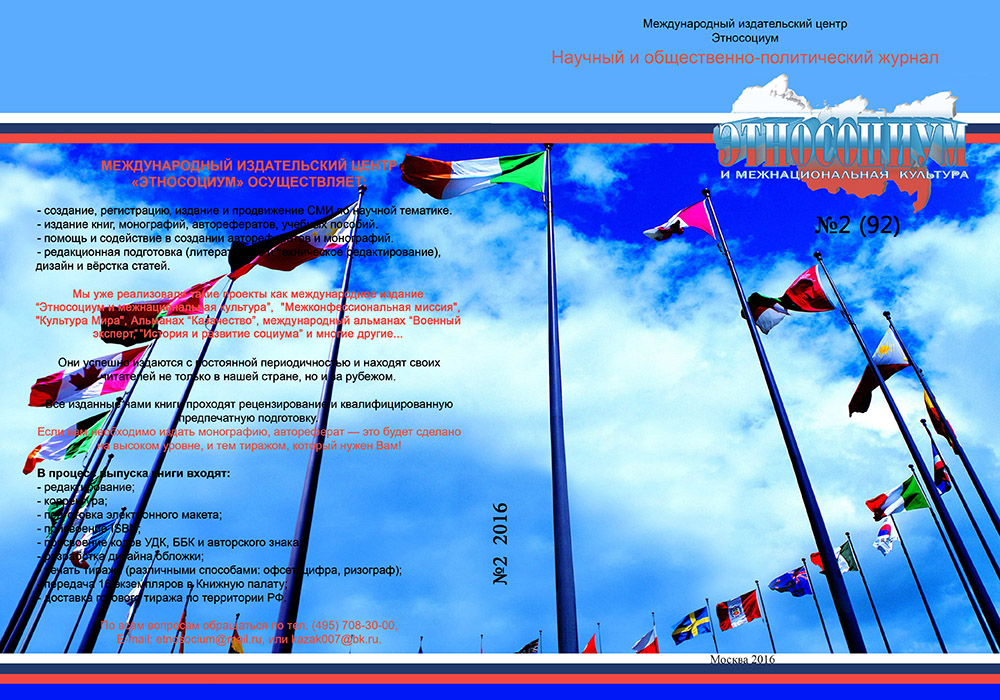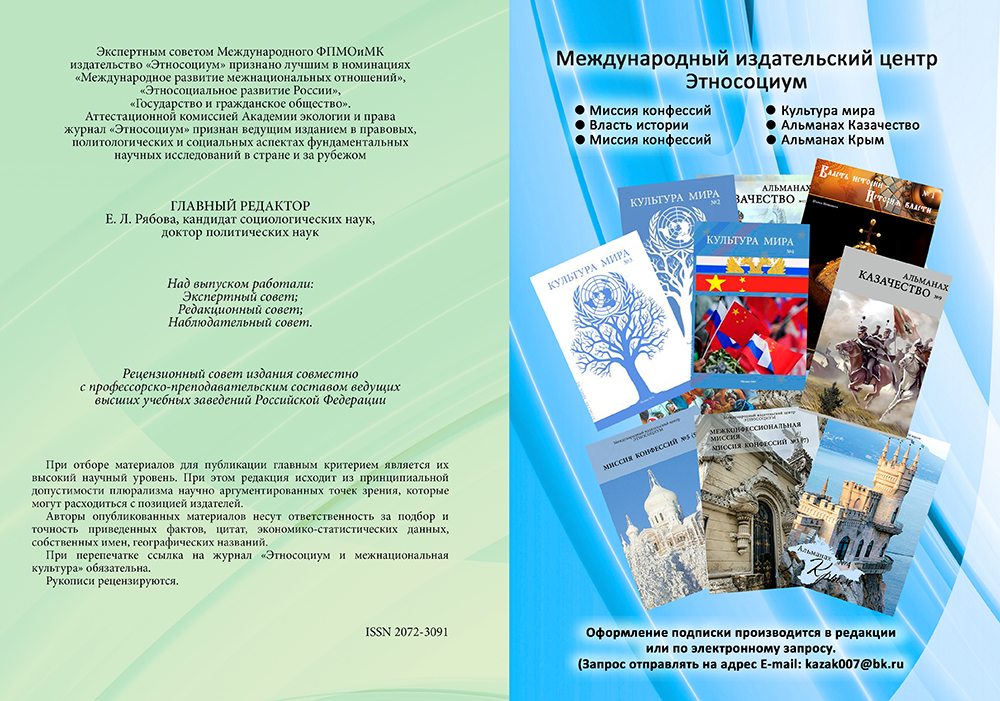

Content
|
COUNCIL OF INTERNATIONAL RELATIONSHIP
|
|
|
Suleymanova S.S., Ryabova E.L. Migration Processes and International, Interethnic Relations in Russia: Interinfluence and the Role of Mass Media
|
9
|
|
Shinkarenko V.D. Some socio-cultural aspects of nation building
|
21
|
|
Anciferova I.V., Ermakov V.M. On the Question of Essence and Meaning of the Notions “mentality” and “mindset”: Contents, Structural and Functional Aspects
|
32
|
|
POLITICS, ECONOMICS, LAW:
ACTUAL PROBLEMS OF MODERN SOCIETY
|
|
|
Boltenkova L.F. Forms of Grass-Roots Democracy in the Russian State: 9th-16th Centuries
|
40
|
|
Ryabova E.I. Law Enforcement of Grass-Roots Democracy in Russia (XVII-XVIII Centuries)
|
49
|
|
POLITICS, ECONOMICS, LAW:
REGIONAL STUDY
|
|
|
Zikin A.V. Bilingualism as an Intercultural and Interethnic Basis: Socio-Philosophical Analysis
|
55
|
|
Burganova I.N. Migration in the EU: the Duality of Politics and Culture
|
62
|
|
Dzutsev H.V., Cogoeva F.B. Public Opinion on Introducing New Education Standards for Modern Secondary Schools in the Republic of North Ossetia-Alania
|
67
|
|
INTERNATIONAL RELATIONSHIPS:
POLITICS, ECONOMICS, LAW
|
|
|
Sharko M.V. The Basic Concepts of Japanese Geopolitics in the Context of the Modern World Transformation
|
79
|
|
Ezhova M.Y. The Erosion of Citizenship in the Era of Tolerant Republicanism
|
93
|
|
CONFERENCE:
Economics and Law
Etnoekonomika in the sustainable development of regions of Russia: the legal basis
Legal regulation of public-private partnerships in a global economy
Russia: state and society in the new reality
|
|
|
Yanuskina V.V. Legal Aspects of Russia’s Language Policy in the southern macro-region: historical experience
|
99
|
|
Karpich Y.V. The Don Cossacks in the Political Processes in the Early Period of the Soviet Government
|
109
|
|
V.I. The dialectics of stability and instability of society: the case of Russian History
|
113
|
|
REVIEW
|
|
|
Radchenko A.F. "Civil society in modern Russia". Review
|
124
|
|
Nugmanova K.J. "Germany and France in the United Europe". Review
|
126
|
|
Annotations
|
128
|
|
Authors
|
135
|
|
Requirements to materials submitted to the international publishing house "Etnosocium"
|
139
|
In the article “Migration Processes and International, Interethnic Relations in Russia: Interinfluence and the Role of Mass Media” the authors analyze such notions as “migration” and “communication” and thus draw a notion of “migratory communication”. The authors note different levels of stability of connections, communication, relations, information interchange, as well as the sorts and character of such communication.
It is concluded that it is necessary to achieve communicative and informative identity in the process of formation and realization of migratory politics.
Communication is a socio-psychological phenomenon in the first place. Migration is communicative; it is followed by social interference that is reflected in socio-psychological information and demands application of adequate methods of studies.
Interchange of information encourages the development of contacts, relations, connections, processes and communication. As a result, communicative-informative relations are formed.
The authors note that migration and migration policy have a communicative nature and are developing with the help of mass media, where mass media play a significant part, especially in the ethnic and informative identity.
Keywords: national politics, migration policy, migration processes, civil society, migration, information analysis, conception, information.
Despite the success of behavior, most individuals almost never self conscious rules, leading them to the goal. Traditional culture, which is absorbed as a living tradition from one generation to the next consists of a large number of different rules. These rules are mostly not verbalicious and reflexivity, but in spite of this, they actively influence the behavior of individuals. Any society consists of a wide variety of rules. To achieve some personal success requires not only effort, but also the leadership necessary to the rules and understanding them. Emotional-sensual perception of the world is complemented by it. Nationalism can be perceived on an emotional level or at the level of rules. If the first is easy enough experienced, the latter require effort for awareness in speech emotional and sensual experiences. Lucid rules operate more effectively and underpin long-term planning.
Keywords: traditional culture, rules, ethnos, nation, sign, meaning, value, society, individual.
In the article, on the basis of comparative analysis and concents-, functional and structural approach, the author speaks on the essence of mentality, its contents, its role in an individual’s functioning and development, social communities and the society as a whole. Mentality and mindset are referred to as one of the forms of spiritual and practical comprehension and transformation of the environment.
Keywords: life energy, life resources, culture, mentality, mindset, social settings and values, traditions.
Having analyzed regulatory rules and regulations, the author draws a conclusion about the existence of real self-governance in Russia, self-organization of people of different groups and social classes.
Keywords: Russian state, statutory instruments, local government, grass-roots democracy, self-governance.
In the article, we highlight the importance of preservation of Russian governing traditions and grass-roots democracy, despite the establishment of absolute monarchy.
Keywords: Russia, absolutism, monarchy, grass-roots democracy.
In the article, we analyze the issues of bilingualism, which is the basis of intercultural and interethnic interaction in the context of culture and civilization.
Keywords: language, bilingualism, intercultural and interethnic interaction, culture, civilization.
The article presents the results of a study of the political and cultural aspects of the flow of migrants into the EU Member States at the moment. An analysis of the issue was performed at different levels: from household between EU citizens and migrant workers directly; a political dialogue between the EU Member States in the matter of this issue; misunderstanding between the people and the government about the reaction to the influx of refugees of other national actors (states). The attention is drawn to some problem areas associated with the increase in cultural conflicts due to the influx of illegal immigrants into the space of the EU. It is shown that the problem of cross-cultural and inter-confessional conflict in the European space today rose into a new level, covering such issues as the threat to its own security for EU citizens, an attack on European values and leveling of cultural identity as Europeans. It is concluded that the internalization of liberal values on the part of the refugees is impossible if workers are not willing to be voluntarily included in the European environment. We demonstrate the political differences between the EU Member States on the practical steps in dealing with the flow of migrants, especially in the light of the adoption of "the Dublin Convention". We also give an estimation of solutions to migration policy on the part of supporters and opponents of migration in the EU (the British and German solution to the problem).
Keywords: migration in EU Member States, European Union; migration, illegal migration, multiculturalism, international relationships, EU integration.
This article is based on the results of summer investigations of 2015 conducted by the North-Ossetian Department of Social Research Institute of Social and Political Studies, Russian Academy of Sciences and the North Ossetian State University n.a. K.L. Khetagurov: “Assessment of efficiency of the secondary education system in the Republic of North Ossetia-Alania in the modern conditions”. The investigation reveal the attitude of the students’ parents to the introduction of new educational standards for modern secondary schools in the Republic of North Ossetia-Alania.
Keywords: education, quality education, modern school, new educational standards, learning process, learning, interest, knowledge quality, economic development, society, modernization, globalization.
In the article, the author speaks on the modern concept of Japanese geopolitics. A special attention is paid to the traditional, basic ideas of Japanese geopolitics in the context of political rivalry of states on the international arena.
Keywords: Japan, Russia, Japanese external policy, international relations, Japanese foreign strategy.
This article is devoted to the search of new models of integration of migrants into the European society. The author analyzes integration programs as the most important instrument of the state's immigration policy, providing the widest range of tools fofr the socialization of migrants into the host society.
Keywords: migration, integration, incorporation, assimilation, citizenship.
The author examines historical and legal aspects of the language policy of the Russian Empire and the Soviet Union concerning the territories, which form the present southern macro-region. The author concludes that the Russian language was serving as a geopolitical instrument for the integration of the North Caucasian territories into socio-economic, legal and cultural space of Russia.
Keywords: the Russian Empire, the Soviet Union, southern macro-region, the North Caucasus, the Lower Volga region, language, language policy.
The author analyzes the political processes of the first revolutionary years in the Don and reveals the role of the Cossacks in the establishment of the Soviet government.
Keywords: politics, subjects of the political process, the Cossacks, the Bolsheviks.